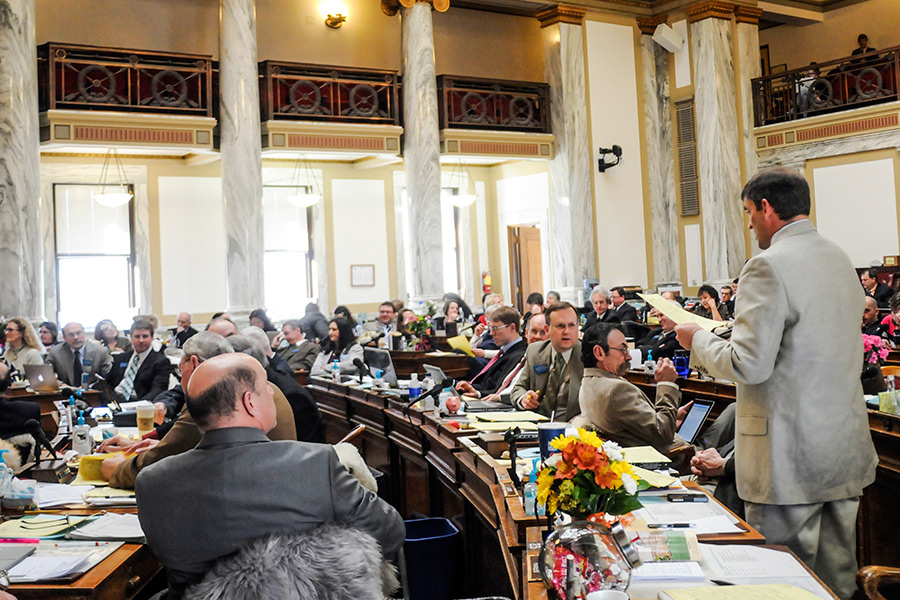Roadkill. It’s what’s for dinner.
One year after Montana lawmakers passed a measure legalizing the collection of roadkill, 865 permits have been issued statewide, with Flathead County residents acquiring the most of any county, according to figures from Montana Fish, Wildlife and Parks.
Montanans harvested elk, deer, antelope and even moose from the state’s roadways in the past year, with the state issuing 135 permits in Flathead County.
Rep. Steve Lavin, R-Kalispell, who carried the bill in the last Legislature, said its purpose was to fill the freezers of Montana families and food banks rather than letting animals killed in highway collisions and their salvageable meat go to waste.
Lavin, who represents House District 4 in Kalispell and is also a captain in the Montana Highway Patrol, said his experience responding to wildlife-vehicle collisions on the state’s highways prompted his drafting the measure.
Although the bill was the butt of jokes initially, Lavin said the high number of permits issued is evidence of the new law’s success.
“In over 22 years with the Montana Highway Patrol, I can’t count the number of times I’ve come across vehicle crashes with wildlife and seen the animals wasted along the roadway. And Montana residents weren’t allowed by law to take the meat,” he said. “I’m very pleased that people are utilizing the new law and Montana families appear to be benefitting from what used to be illegal and wasteful.”
“My intent when drafting the bill was to reduce waste and maybe help a few people out at the same time,” he added. “It became quite a joking matter, but that’s OK.”
Under the new law, free permits can be downloaded online from the FWP’s website. The permits can also be issued by law enforcement officers who respond to wildlife-vehicle collisions, such as Montana Highway Patrol troopers.
Montana’s roadkill law allows a person to pick up deer, elk, moose or antelope. The free permit – called a vehicle-killed wildlife salvage permit – must be downloaded within 24 hours.
The law requires that the whole animal be picked up, and a resident can’t eviscerate the animal in the borrow pit. Only officers can kill animals that are still alive.
Game wardens have the right to contact anyone who claims roadkill, and may inspect the animal. The meat cannot be sold and must be used for human consumption.
Flathead County leads the state for the most roadkill permits issued at 135, followed by Lincoln with 92 and Missoula with 83. Other western Montana counties with high numbers of permits issued, which correlate to the region’s dense concentrations of game, include: Gallatin County, which tallied 76 permits, Ravalli with 72 permits and Lewis and Clark with 46. Yellowstone, the largest county by population in the state, saw 29 permits issued, Cascade recorded 24 and Carbon County 11.
The figures, recorded by the FWP, show that about twice as many motorists requested the permit after finding the animal along the roadside, accounting for more than half the permits, compared to those who were directly involved in a vehicle-wildlife collision.
The majority of the retrieved roadkill were whitetail deer at more than 550 animals, followed by mule deer at nearly 150 permits; elk at 120 permits; and 33 moose permits.
Opponents of the measure questioned whether the meat would be safe and whether it would create liability issues for food banks that accept it, while cattle ranchers questioned how roadkill could be harvested for food when the cattle industry must follow strict federal regulations.
Lavin said Montana hunters are experienced and can discern whether roadkill animals are salvageable.
“There is a ton of sportsmen in Montana and we can figure that out,” he said. “If you’re not likely to figure that out, you’re not likely to be harvesting roadkill.”
He said Montana food banks have been salvaging roadkill for years, even though it was technically illegal.
“Now they are able to come get it and actually feed needy people,” he said. “So it is nice to fix the law to allow that function there.”
Montana ranks third in the nation for wildlife-vehicle collisions, according to State Farm insurance, which calculated that Montana motorists have a one in 75 chance of hitting an animal.
